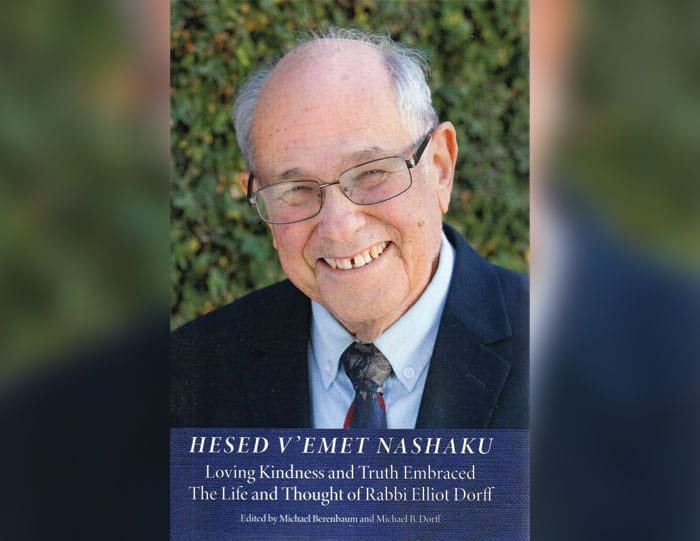
Los Angeles Jewry is blessed with outstanding rabbis, scholars, and teachers. Prominent among them is Rabbi Dr. Elliot Dorff, a beloved teacher and mentor to myriad students at and beyond American Jewish University (formerly, University of Judaism) which has been his academic home for more than 50 years. On the milestone of Rabbi Dorff’s 80th birthday, Michael Berenbaum, Director of the Sigi Ziering Institute at AJU, and Michael Dorff, the Michael and Jessica Downer Chair at Southwestern Law School (and a son of Elliot and Marlynn Dorff), have edited a collection of essays in his honor titled “Hesed V’Emet Nashaku, Loving Kindness and Truth Embraced: The Life and Thought of Rabbi Elliot Dorff.”
Rabbi Dorff is goodness personified, a model of everything he teaches, and an accomplished scholar with an abiding commitment to academic rigor and intellectual honesty in pursuit of truth.
Anyone who knows Elliot Dorff immediately appreciates the title of the book. Rabbi Dorff is goodness personified, a model of everything he teaches, and an accomplished scholar with an abiding commitment to academic rigor and intellectual honesty in pursuit of truth. The volume opens with a brief biographical sketch by Michael Dorff, and reminiscences starting from 1971 of former student and long-time colleague Robert Wexler. The book’s 400 pages include more than 20 essays authored by friends and colleagues from near and far.
Contributors to the volume include scholars from seminaries and universities across the country such as David Ellenson, Arnold Eisen, Louis Newman, Pamela Barmash, and David Gordis. L.A.-based contributors include, among others, David Wolpe, Aryeh Cohen, Gail Labovitz, Bill Cutter, Pinchas Giller, and Steve Spiegel. Just as Rabbi Dorff’s scholarship is far-ranging — he has authored, edited or co-edited 25 books and over 200 articles on Jewish thought, law, and ethics — the range of topics explored in this Festschrift is quite broad.
Arnold Eisen’s essay explores Rabbi Dorff’s theology as developed in his book Knowing God (1992), pointing to the twin imperatives of holding to belief in “the God of the philosophers” as well as belief in the “God of Abraham, Isaac and Jacob.” In an article that analyzes varying responses to perceived dissonance between traditional beliefs and practices and rational considerations, David Gordis identifies Dorff as among those “philosophically sophisticated religious scholars” who “seek to find consistency between the rational and emotional claims and assertions of religious tradition.” Michael Berenbaum traces the spiritual biographies of Martin Buber, Franz Rosenzweig, and Abraham Joshua Heschel, and Chaim Seidler-Feller examines the notion of the “Becoming” God (Ehyeh asher Ehyeh), the God of Possibilities.
Louis Newman focuses on Dorff’s ethical writings, observing that “his contributions to contemporary Jewish ethics are arguably among the most extensive and carefully articulated of any figure in our field.” He writes that Dorff’s work incorporates two ends of a spectrum: Pragmatism and idealism. While Dorff seeks to improve society incrementally through the halakhic process, his view is that broad ethical ideals must complement and help shape Jewish law. In Dorff’s words: “God requires us to aspire to a moral and theological ideal”; hence, the notion of lifnim mishurat hadin, i.e, moral duties must extend beyond the letter of the law.
David Ellenson revisits an exchange of views between Elliot Dorff and Eugene Borowitz, a leading Jewish thinker of the Reform movement, that appeared in the pages of Conservative Judaism. For Borowitz and the Reform movement, “the autonomous Jewish self” is paramount, Dorff believes that “the Conservative approach requires us constantly to check our own understanding of God’s will with that of other Jews”; autonomy must be balanced by community. For Dorff, the Law Committee of the Conservative movement’s Rabbinical Assembly and its decision-making process maintain “coherence and community,” avoiding “anarchy and isolation.”
Pamela Barmash, who chairs the Conservative movement’s Committee on Jewish Law and Standards — a committee on which Elliot Dorff has played a vital role over decades, authoring countless Jewish legal opinions and serving as chair for many years — writes of the role of the posek (Rabbinic Decisor) in Jewish law. Essays on matters of Jewish law include such topics as giving sanctuary to refugees (Aryeh Cohen), reconsidering presumptions of consent in matters of marriage and divorce (Gail Labovitz), body piercings (David Golinkin), and more. Rabbi Yosef Kanefsky, an Orthodox rabbinic colleague in Los Angeles, contributes an essay on assisting those who are poor and homeless with dignity and respect, emerging from his congregation’s experience.
Writing of Rabbi Dorff, Rabbi Kanefsky well expresses the sentiments of so many who have encountered him: “I’m not an expert on angels, and I know that none of them actually inhabit the earth. But if one is seeking a teacher of Torah, wisdom and life that comes as close to angelic as we get on this planet, Rabbi Dorff is your man. He is a model for all of us who teach, through his love for the Torah, his love for his students, the integrity he brings to everything he does, and his unshakeable faith in the God of Israel, the Torah of Israel and the People of Israel.”
Professors Berenbaum and Dorff have compiled a superb collection of essays by eminent rabbis and scholars offering insightful perspectives on topics of contemporary Jewish thought and practice. I have touched on but half of the articles that comprise this impressive tribute volume. Of the essays in this book, as of Rabbi Dorff’s writings and teaching, one can surely say, borrowing from the words of Isaiah, that, through them, yagdil torah v’yadir: The Torah is made great and glorious.






















 More news and opinions than at a Shabbat dinner, right in your inbox.
More news and opinions than at a Shabbat dinner, right in your inbox.